Centre for Policy Development's Blog, page 18
January 14, 2021
Jen Jackson: Early childhood educators are leaving in droves. Here are 3 ways to keep them, and attract more
Published in The Conversation on 15 January 2021
Childcare centres across Australia are suffering staff shortages, which have been exacerbated by the COVID crisis.
Many childcare workers across Australia left when parents started pulling their children out of childcare due to the pandemic, especially casuals not eligible for JobKeeper. And when the federal government introduced its temporary free childcare package, centres struggled to get the staff back.
The situation is not new. In a 2016 survey of 1,200 early childhood educators and teachers in childcare centres and preschools across Australia, one in five said they planned to leave their job within a year. The reasons included low pay, feeling undervalued and increasing time spent on paperwork.
And a survey conducted in 2019 showed up to two in three early childhood educators in Victoria were considering leaving their role. High staff turnover — of up to 30% — is an enduring problem in early childhood services.
Whenever an educator leaves the sector, it’s a loss for children that affects their learning and well-being. Staff turnover also means more public money needs to be spent training new workers.
Based on unpublished Mitchell Institute analysis of ABS census data, just over half the educators who have gained early childhood certificates since 2012 (when qualification requirements were introduced) are still working in relevant jobs. In comparison, almost all of those who completed vocational certificates in building are still in relevant roles.
To address workforce issues in the sector, Australian governments are developing a National Early Childhood Workforce Strategy, due for release in the latter half of 2021. It’s more important than ever before to get this right.
A report from the Mitchell Institute shows three policy moves needed to retain and attract skilled educators to the sector.
1. Early childhood careers need to be valuedTeaching and caring for young children is complex, and requires people with the right training and qualifications. Qualified educators provide better-quality education and care, which benefits children’s learning and development, as numerous international studies have shown.
Yet, most early childhood educators are paid well below the Australian average gross weekly earnings. Educators with vocational certificates are the lowest paid, and earn less for doing skilled work with children than a trainee working in a call centre.
These educators are vital to the sector’s survival: they make up almost 40% of the early childhood workforce, working alongside colleagues with diplomas and degrees.
Recent gains have been made in some states. Victoria has introduced a pay increase of up to 31% for qualified preschool teachers. But this only covers a small proportion of the around 50,000 educators in the state.
More people using early childhood education and care services, and governments lifting the bar for quality, means Australia will still need to recruit 6,800 degree-qualified early childhood teachers to 2024, as well as over 30,000 more educators with vocational diplomas and certificates. This will only happen if all educators are valued, and have opportunities for rewarding careers.
2. Educator well-being needs to matter tooCOVID-19 has been tough on early childhood educators’ well-being. While school teachers had it tough with the transition to remote learning, early childhood educators also had to contend with rapid changes to policy, funding and work arrangements, as governments worked to keep the sector afloat.
The well-being of educators matters to children’s learning. Recent Australian research shows that educators with greater well-being can better respond to children in playful, educational ways that support their learning and development. Educators need support for their physical health and well-being, especially given the challenges of maintaining COVID-safe environments.
Early childhood educators have experienced many stressors during the pandemic. Many have worked hard to adapt their services to the changing needs of children and families, whose lives were turned upside down. Others have experienced financial insecurity themselves, or uncertainty about their future employment.
Under any circumstances, educators need support to cope with the emotional labour of working with young children, and putting their heart into their job.
Research shows one way to boost retention and well-being for early childhood educators is to have meaningful career paths and supportive workplace cultures. While 80% of educators feel supported by their managers, low wages and limited access to professional development and promotion constrain educators’ careers.
Expert educators need more opportunities to become mentors and leaders, to motivate them to stay in the sector and inspire new educators to learn.
3. Streamline funding responsibilityThe reason it’s so hard to get educators’ pay and conditions right is that the money comes from different sources.
Governments pay around half the total cost of early childhood services, mainly through the childcare subsidy from the Australian government that helps families pay fees. State governments also contribute to preschool. Families pay the remainder of the fees, with many paying more for early childhood services than they would for private schools.
Employers ultimately make decisions about how much to pay their staff, within various industrial agreements.
This means educators’ wages and conditions are everybody’s problem and nobody’s problem. Former Education Minister Dan Tehan has said paying educators more is up to employers. Employers and unions argue governments need to contribute more funding to the sector before educators’ wages can increase.
Families are already stretched, and passing costs on to them seems unthinkable in the current economic climate.
Similar problems arise in determining who pays for improvements to educators’ conditions, such as making sure they have enough time for professional development (something few currently receive).
Government funding to early childhood services needs to be high enough to support fair wages, and delivered in a way that ensures it is spent well. With different funding models in each state, and thousands of employers, it won’t be easy to design a system that works for everyone. But governments have a responsibility to Australian families to ensure all educators are paid enough to stay.
Can Australia get this right in 2021? Maybe – in 2020, governments, employers and unions worked together on some of the most critical workforce challenges Australia has faced. Perhaps the education and care of our children will be important enough to bring them together again.
The post Jen Jackson: Early childhood educators are leaving in droves. Here are 3 ways to keep them, and attract more appeared first on Centre for Policy Development.
December 17, 2020
CPD is Hiring
We’re looking to recruit two Advisers or Economists and a Policy Adviser. Read on to see if you fit the bill.
Adviser / Economist
CPD is looking to hire two Advisers or Economists to join our expanding Sustainable Economy team and support other CPD initiatives. The successful candidates will lead quantitative research projects looking into living standards for low-to-middle income households, decarbonisation, regional development, and wellbeing.
About CPD
The Centre for Policy Development is one of Australia’s leading independent policy institutes. Founded in 2007, we are a mission-driven organisation led by a dynamic CEO and distinguished Board of Directors, and we are seeking exceptional talent to join our growing team.
This role offers the opportunity to make a substantial contribution to policy development in Australia, and is an ideal career move for a motivated individual. You will be joining a smart, energetic, dedicated team at an organisation with a unique culture that will foster your skills, broaden your horizons and engage your passion for ideas.
About the Role
The successful candidate will be based in CPD’s Sydney or Melbourne office. Remote work may be possible. The positions are advertised as full-time, but we support flexible work and will consider part-time for the right candidate. Remuneration for the position is competitive and will be determined based on the experience of the selected candidate.
The roles are analytically demanding: we want to bring novel data-driven insights to long-term problems. Previous experience of policymaking is useful, but we are primarily looking for strong analytical skills, intellectual creativity, and an ability to grapple with complex concepts and communicate them well. In practice, this would suit someone with experience analysing Australia’s tax-and-transfer system, labour market outcomes, firm-level industrial organisation, carbon accounting, trade/GVCs, Australian regional development, or other related issues.
Our team enjoys frequent interaction with policymakers in government, media, and the wider policy world. You’ll be joining a close-knit team that delivers real impact at senior levels of policymaking. This is an exciting opportunity to contribute to a new analytical agenda.
Main duties and responsibilities
undertake original research and economic analysis on incomes, employment, wealth, wellbeing, decarbonisation, and regional development
author research notes and publications, working independently under the direction of senior staff
develop ideas for new avenues of exploration and research
write up the findings of primary analytical work and conduct secondary analysis of relevant literature
build and develop the profile of CPD, including by looking for new avenues of research for the project to deepen and broaden its impact
monitor external policy developments relevant to the research program
occasional out-of-town travel (including overnight travel)
Selection criteria
ability write confidently and clearly
ability to innovate and take the initiative in developing new projects, methodologies, and ideas
strong analytical rigour, with an ability to perform and communicate complex analysis
ability to work at pace on several different projects at once, coordinating multiple agendas and delivering to deadlines
an understanding of the wider economic and social policy context in Australia
experience using statistical software packages to manage large datasets (Stata or R)
understanding and enthusiasm for the Sustainable Economy program
expertise in any of the focus areas of the Sustainable Economy program
Desirable
postgraduate degree, or undergraduate degree combined with relevant work experience
direct experience analysing Australian survey microdata (such as HILDA, LFS, SIH) or using tax-and-transfer microsimulations (such as PolicyMod, CAPITA, MITTS, STINMOD)
experience working directly with policymakers, or in another field that involved making decisions (or advising decision-makers) in a political context
experience in applied research aimed at impacting policy and practice
experience working in a research-intensive organisation
appreciation of the benefits of mixed-methods research
How to Apply
Candidates can apply via email to admin@cpd.org.au by 5pm AEST on Wednesday 27 January 2021. Applications should include a cover letter (describing the applicant’s interest and suitability against this job description), a CV, and a sample of writing for a general audience.
We aim to hold interviews in early February. Before a final list of candidates is interviewed, long-listed candidates will be asked to perform a pre-interview task that will involve using Stata or R to analyse a dataset.
The Centre for Policy Development is committed to being a diverse and inclusive workplace. We encourage applicants of all backgrounds, cultures, genders, abilities and experiences to apply.
Policy Adviser
CPD is looking to hire a policy adviser to join our expanding team. The successful candidate will support research projects across multiple CPD programs.
About CPD
The Centre for Policy Development is one of Australia’s leading independent policy institutes. Founded in 2007, we are a mission-driven organisation led by a dynamic CEO and distinguished Board of Directors, and we are seeking exceptional talent to join our growing team.
This role offers the opportunity to make a substantial contribution to policy development in Australia, and is an ideal career move for a motivated individual. You will be joining a smart, energetic, dedicated team at an organisation with a unique culture that will foster your skills, broaden your horizons and engage your passion for ideas.
About the Role
The successful candidate will be based in CPD’s Sydney or Melbourne office. Remote work may be possible. The positions are advertised as full-time, but we support flexible work and will consider part-time for the right candidate. Remuneration for the position is competitive and will be determined based on the experience of the selected candidate.
Our team enjoys frequent interaction with policymakers in government, media, and the wider policy world. You’ll be joining a close-knit team that delivers real impact at senior levels of policymaking. This is an exciting opportunity to make a genuine contribution to policy development and innovation in Australia.
Main duties and responsibilities
Deliver rigorous quantitative and qualitative analysis and policy recommendations, communicating where possible in plain and accessible language.
Undertake original research, develop ideas for new avenues of exploration, manage and deliver research projects, including scoping policy issues, author research notes and publications, working independently under the direction of senior staff.
Build relationships with stakeholders, identifying and engaging key stakeholders across CPD’s programs.
Edit and arrange peer review, and liaise with the Company’s Research Committee, Fellowship and other experts and stakeholders on current and future projects within the Company’s policy programs.
Work collaboratively with the policy and research team, including interns, fellows and contractors.
Ability to undertake occasional travel (including overnight travel)
Selection criteria
ability write confidently and clearly
ability to innovate and take the initiative in developing new projects, methodologies, and ideas
strong analytical rigour, with an ability to perform and communicate complex analysis
ability to work at pace on several different projects at once, coordinating multiple agendas and delivering to deadlines
an understanding of the wider economic and social policy context in Australia
understanding and enthusiasm for the CPD’s program areas and major initiatives, in particular the Sustainable Economy Program and Early Childhood Development Initiative.
Desirable
postgraduate degree, or undergraduate degree combined with relevant work experience
experience working directly with policymakers, or in another field that involved making decisions (or advising decision-makers) in a political context
experience in applied research aimed at impacting policy and practice
experience working in a research-intensive organisation
appreciation of the benefits of mixed-methods research
How to Apply
Candidates can apply via email to admin@cpd.org.au by 5pm AEST on Wednesday 27 January 2021. Applications should include a cover letter (describing the applicant’s interest and suitability against this job description), a CV, and a sample of writing for a general audience.
We aim to hold interviews in early February.
The Centre for Policy Development is committed to being a diverse and inclusive workplace. We encourage applicants of all backgrounds, cultures, genders, abilities and experiences to apply.
The post CPD is Hiring appeared first on Centre for Policy Development.
Third Climate & Recovery Initiative stakeholder roundtable
On 23 November, CPD and our partners convened the third stakeholder roundtable in our Climate & Recovery Initiative (CRI).
The CRI was established in May 2020 to drive a stronger alignment between COVID-19 recovery and climate priorities. The Initiative is co-ordinated by CPD and ClimateWorks Australia, with a steering group that includes Australian Industry Group (AIG), the Australian Council of Trade Unions (ACTU), and Pollination. You can read more about the CRI, including detailed information on earlier roundtables and policy proposals here. Each of the roundtables have been held under the Chatham House Rule.
November’s roundtable was an opportunity to consider Australia’s roadmap to COP26 and to highlight how a more ambitious Australian agenda on climate can support recovery and rebuilding priorities into 2021 and beyond. Participants heard directly from Her Excellency Vicki Treadell CMG MCO, British High Commissioner to Australia, on the UK’s ramped up domestic and diplomatic focus on climate ahead of hosting COP26 in November 2021. The group also shared views on how the incoming Biden Administration and a raft of major net zero commitments in Asia could reshape the global climate agenda and Australia’s economic and diplomatic outlook. (We touched on similar themes as part of a CRI public forum hosted immediately prior to the roundtable, which featured remarks from key CRI participants including Geoff Summerhayes, Anna Skarbek and Don Russell).
Further information on the roundtable agenda, participants, proposals and discussion points is available in the briefing pack below. This includes a ‘roadmap to COP26’ which sets out a number of key themes, proposals and options to strengthen Australia’s position over the next 12 months. This roadmap was built around five priorities:
Secure Australia’s position in a green global economy
Vision for jobs and transitions in key regions
Accelerate key investments and accountability mechanisms
Build net zero potential for 2050
Strengthen 2030 targets.
Key documents
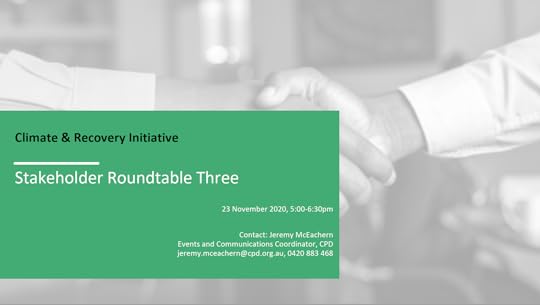
Briefing Pack
Related reading
More information on earlier Climate & Recovery Initiative and roundtables
Climate & Recovery Initiative Public Forum – 23 November 2020
The post Third Climate & Recovery Initiative stakeholder roundtable appeared first on Centre for Policy Development.
December 10, 2020
Travers McLeod, Frances Kitt & Krystal Lockwood: Prison stems from disadvantage and entrenches it
Published in The Australian on 10 December 2020
The story of Richmond’s two-time premiership player Marlion Pickett reads like a fairytale. He went from youthful crime and prison time in Western Australia to playing his first AFL game at age 27 in last year’s grand final at a packed MCG and being among the best on the ground. This year, in his 20th AFL game, he won his second premiership medal.
Sadly, Pickett’s story is the exception to the rule. Our new report, Partners in Crime, shows that Australia’s criminal justice systems are far more likely to keep people on the same path than put them on a new, more hopeful one because incarceration creates and compounds multiple forms of disadvantage that are closely entwined with getting in trouble with the law.
A few statistics illustrate the problem. A survey of prisoners shows about a third reported being homeless in the month before going to jail, but more than half expected to be homeless when they got out. About half of prison entrants were employed before being locked up, yet less than a quarter had jobs organised on release.
With no work and no home to go to, it is hardly surprising people leaving prison are more likely than not to return to the corrections system within two years.
After doing time, ex-prisoners generally go back to communities that often lack the financial means and social resources to support them adequately. This makes it likely the disadvantage compounds and becomes cyclical, often down the generations.
Almost one in five surveyed prisoners had a parent or carer in prison when they were a child. About 77,000 children were estimated to have a parent in prison in 2018. These children are the innocent victims of the criminal justice conveyor belt.
Criminal justice systems have become the default response to disadvantage. In place of getting the support they need, ever more people are locked into cycles of disadvantage, at great cost to human dignity, and damaging not only prisoners but their families and communities. The impact is particularly devastating for Indigenous Australians, overrepresented at every stage of our criminal justice systems. They experience higher rates of victimisation and police contact, and are the most incarcerated people in the world, as the Uluru Statement from the Heart reminds us.
Before COVID-19 struck, incarceration rates had been rising despite falling crime rates. Most states and territories have incarceration rates above the global average, which is enormously costly to taxpayers. In 2017-18, total net operating expenditure on prisons was $3.4bn, rising to $4bn when community corrections are included. And that does not include the capital costs of building new facilities. In its 2019 budget, Victoria alone announced a record $1.8bn spend to accommodate an extra 1600 prisoners.
On the evidence, no jury would be convinced that more prisons and tougher sentences will make society safer. Recently, some US states have managed to close prisons and reduce crime rates. Proportionally, Germany locks up far fewer people than we do, yet has a lower homicide rate.
We need to find more effective and efficient ways to reduce crime and increase community safety. Prison systems have a role to play. The public demands offenders pay a penalty for breaking the law. Victims of crime legitimately expect to see justice done. Yet we also want our systems to reform offenders so they can lead productive lives. And the best investment would be services that ensure people aren’t sucked into the system in the first place.
Australia’s most vulnerable people are caught up in criminal justice systems that lack a unified purpose, oscillating instead between the conflicting aims of punishment, deterrence, restitution and rehabilitation.
We need to make a clearer choice about the purpose of such systems. Holding people in jail is a policy choice, one often driven by community anxiety about crime. But it’s often the wrong choice.
COVID-19 shows us things could be different. A fall in the number of people entering custody demonstrates the possibility of alternatives, of lowering incarceration rates and of crafting a different narrative on crime and justice that doesn’t trap us into repeating, or amplifying, the same failing measures.
This needs co-ordination between employers, industry, civil society, communities, service providers, philanthropy, and people with lived experience. It calls for high-quality evidence and evidence-based decision-making. And it requires hard work at the systems and community levels.
Marlion Pickett should not be the exception to the rule.
The post Travers McLeod, Frances Kitt & Krystal Lockwood: Prison stems from disadvantage and entrenches it appeared first on Centre for Policy Development.
December 9, 2020
Partners in Crime: the relationship between disadvantage and Australia’s criminal justice systems
The Centre for Policy Development is pleased to make available a report on the relationship between disadvantage and Australia’s criminal justice systems.
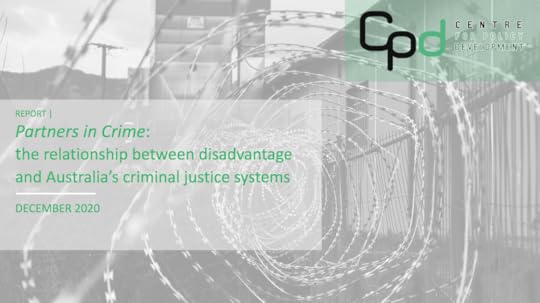
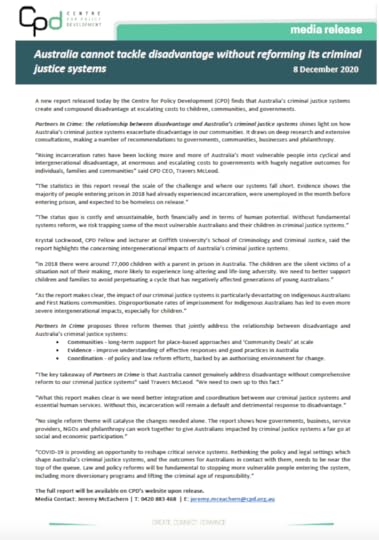
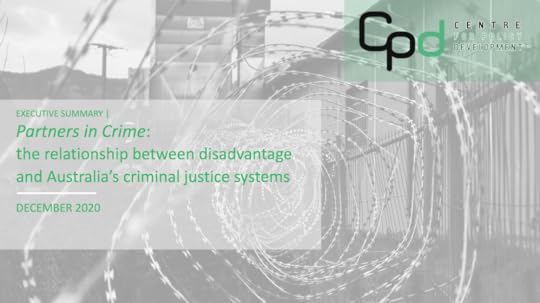
Partners in Crime: the relationship between disadvantage and Australia’s criminal justice systems
Media Release
Executive Summary
The report draws on findings from a range of consultations with experts from across the sector including academics, service providers, practitioners, government and community actors from multiple jurisdictions, through individual consultations, roundtable discussions, field trips and conferences.
Partners in Crime found that disadvantage for Australia’s most vulnerable people is compounded as they pass through one of ten criminal justice systems — one for each state and territory, one federal system and a de facto tenth system, as all systems are experienced differently by Aboriginal and Torres Strait Islander peoples. These systems have increasingly become the default policy response to complex disadvantage. As Professor Eileen Baldry, Leanne Dowse and Melissa Clarence have pointed out, when people experience persistent disadvantage and have complex needs they “don’t just fall through the cracks, they are directed into the criminal justice conveyor belt”, a cycle which is easier to enter than to leave.
These systems are trapping more individuals, families and communities in cycles of disadvantage. Before COVID-19, we were jailing more people than at any time since 1900, in both total number and per capita. Most Australian states have an incarceration rate above the global average, except the ACT and Victoria.
The report finds that Australia’s prison population is now disproportionately made up of some of Australia’s most vulnerable people, including Aboriginal and Torres Strait Islander peoples, individuals with mental health conditions and disability, and people with a history of family incarceration. And criminal convictions are concentrated in a relatively small number of areas experiencing broad disadvantage.
Partners in Crime contends that for the most vulnerable Australians, contact with the criminal justice systems causes disadvantage and exacerbate vulnerability. A survey of prisoners showed that many face higher homelessness on release than on entry, and they also experience significant barriers to employment.
The report suggests that Australia cannot tackle disadvantage without comprehensive reform to its criminal justice systems, at the community and systems levels, backed up by evidence.
It proposes three drivers of change that can work together to address this challenge, with no one change sufficient.
Communities — long-term investment in local communities to support vulnerable families and people most at risk of entering criminal justice systems, including ‘Community Deals’ for justice reinvestment;
Evidence — gather better data to improve understanding of effective responses and inform new strategies, including an Australian ‘what works’ centre; and
Coordination — of policy and law reform efforts, underpinned by an intergovernmental process with a broad coalition to build the authorising environment for change.
The COVID-19 pandemic has brought key issues in the criminal justice system into sharp focus and offers an opportunity to look at the law and policy reforms which are available and required to re-imagine how systems can deliver for all Australians. There is a unique opportunity for governments, philanthropy, service providers, communities, legal practitioners, and employers across jurisdictions to realise these changes.
Quotes from CPD on the release of Partners in Crime: the relationship between disadvantage and Australia’s criminal justice systems:
Travers McLeod, CEO, Centre for Policy Development
“Rising incarceration rates have been locking more and more of Australia’s most vulnerable people into cyclical and intergenerational disadvantage, at enormous and escalating costs to governments with hugely negative outcomes for individuals, families and communities ”
“The status quo is costly and unsustainable, both financially and in terms of human potential. Without fundamental systems reform, we risk trapping some of the most vulnerable Australians and their children in criminal justice systems.”
Krystal Lockwood, CPD Fellow and lecturer at Griffith University’s School of Criminology and Criminal Justice
“In 2018 there were around 77,000 children with a parent in prison in Australia. The children are the silent victims of a situation not of their making, more likely to experience life-long adversity. We need to better support children and families to avoid perpetuating a cycle that has negatively affected generations of young Australians.”
Peter Harmsworth, former Director-General, Office of Corrections (Victoria: 1987 – 1992) and former Secretary, Department of Justice (Victoria: 1998 – 2003)
“Pockets of persistent disadvantage have existed across a small number of communities in Australia for many decades, especially in Aboriginal and Torres Strait Islander communities. The disadvantage experienced is cyclical and intergenerational in nature which has been driven in part by a person’s involvement with the criminal justice system. It has become a fairly blunt instrument in dealing with many of society’s social, economic and medical ailments. Policy changes over the last two decades has effectively widened the net with prison numbers soaring and recidivism remaining high. Correctional budgets have been stretched with the focus more on human warehousing than on rehabilitation and breaking the offending cycle.”
“Significant and deep change is needed. International research points to successful interventions and policy changes in a number of jurisdictions that have led to falling prison numbers and falling recidivism rates without impacting on community safety levels. A better understanding of what works in improving the criminal justice system, in effectively engaging governments to better understand the social and financial benefits of policy reforms, and adopting more place based approaches to address the geographically-located drivers of disadvantage for ex-prisoners and their families through bringing together key supports across all levels of government, can only lead to fairer and more just societies where disadvantage is reduced.”
Acknowledgements
Partners in Crime: the relationship between disadvantage and Australia’s criminal justice systems was undertaken by a team of CPD researchers, including Frances Kitt, Allison Orr, Caitlin McCaffrie, Travers McLeod, and CPD research intern Ben Maltby, with assistance from Rod Marsh and Peter Harmsworth AO. CPD also formed an informal advisory group, drawn from members of CPD’s Research Committee and Board.
This report has been developed under CPD’s ongoing Effective Government Program, which examines the role of government and public policy in the 21st century, including the role and delivery of effective services in addressing social and economic disadvantage in Australia. The analysis presented in this report was initially undertaken as part of a study for the Paul Ramsay Foundation. Together, we hope that the analysis and ideas help to encourage fundamental reforms to our criminal justice systems and thereby disrupt cycles of persistent disadvantage in Australia.
Our research for this report informed our Transitions to Employment Roundtable series which considered interventions that government, business and philanthropy could pursue to tackle long term unemployment and underemployment for the groups in our society facing the greatest disadvantage, including those in contact with the criminal justice system. The final report draws on those conversations, as well as those which have taken place as part of our ongoing ANU-CPD Policy Dialogue series.
We are grateful to all those who participated and made this report possible, particularly those with personal experience of Australia’s criminal justice systems, many of whom have provided feedback throughout the development of this report. We hope it can help Australian communities to build back better in the wake of COVID-19.
Links and related media
Partners in Crime: the relationship between disadvantage and Australia’s criminal justice systems
Media Release
Executive Summary
Australia’s incarceration rate jumps 47 per cent in two decades, Travers McLeod talks to NewsRadio’s Thomas Oriti about Partners in Crime, 10 December 2020
Paige Taylor, Prison population high as crime falls, The Australian, 10 December 2020
Travers McLeod, Frances Kitt & Krystal Lockwood, Prison stems from disadvantage and entrenches it, The Australian, 10 December 2020
Blueprint for Regional & Community Job Deals
ANU-CPD Policy Dialogue, ‘The Australian criminal justice system and deep disadvantage’
Transitions to Employment: People in contact with the criminal justice system
2020 John Menadue Oration with Professor Megan Davis, ‘Can Australia Deliver?’
Travers McLeod, Here are 10 steps to build a stronger Australia after coronavirus, The Guardian, 05 May 2020
Sam Mostyn and Travers McLeod, Coronavirus is a human crisis beyond most of our scariest dreams – we will need to restart our society, The Guardian, 04 April 2020
Sam Mostyn & Travers McLeod, Australia needs to find its heart, brain and courage to recover from the COVID nightmare, The Guardian, 11 October 2020
The post Partners in Crime: the relationship between disadvantage and Australia’s criminal justice systems appeared first on Centre for Policy Development.
November 19, 2020
Climate & Recovery Initiative Public Forum
On 23 November, CPD co-hosted a public forum as part of the Climate & Recovery Initiative. We were joined by three special guest speakers: APRA Executive Board Member Geoff Summerhayes, ClimateWorks Australia CEO Anna Skarbek, and AustralianSuper Chair and former Australian Ambassador to the United States, Don Russell.
The discussion focussed on climate change, the COVID-19 recovery and the road ahead in 2021, taking stock of recent global developments on climate and clean energy and the implications for Australia as we look towards next November’s COP26 summit. It was also a chance to highlight the important work underway through the Climate & Recovery Initiative, a new collaborate effort we are running with ClimateWorks Australia and other partners to identify the best ideas and opportunities to align Australia’s economic recovery with a net zero transition. You can read more about the Climate & Recovery Initiative here.
In his remarks, Geoff Summerhayes highlighted important steps that Australian institutions and regulators had taken to step up their focus on climate risk, and said these put us in a stronger position to tackle the challenges ahead:
“With both risks and opportunities rising, it will be critical for Australian firms to ensure that they have sufficient responses to both physical and transition risks, but also are maintaining our highly regarded financial sectors’ competitiveness in the emerging green economy.”
“I’m encouraged that we’re up for the challenge – not just of responding to risk, but of seizing new financial sector opportunities that will flow from this next industrial revolution, to a low carbon future.”
Related Links
Background on the Climate & Recovery Initiative, including objectives, participants and key proposals.
Business, unions unveil green national building plan, James Fernyhough, Australian Financial Review, 28 September 2020.
‘Deadbeat countries’: AustralianSuper calls on PM to ditch carryover credits, The Sydney Morning Herald, 24 November 2020.
The Australian Government is surrounded by leaders taking climate action. Will it step up?, Michael Slezak, ABC, 22 November 2020
Transcript of Don Russell’s remarks to the Climate & Recovery Initiative Public Forum.
Transcript of Geoff Summerhayes’ remarks to the Climate & Recovery Initiative Public Forum.
The post Climate & Recovery Initiative Public Forum appeared first on Centre for Policy Development.
November 11, 2020
Our Federation and education in the wake of COVID-19 | ANU-CPD Policy Dialogue | October 2020

On 8 October, we hosted our first ANU-CPD Policy Dialogue for 2020, on ‘Our Federation and Education in the wake of COVID-19’. Due to the COVID-19 pandemic, we are now hosting this series as virtual roundtables, focussing on issues of the Federation and related topics that have emerged during the pandemic.
The Dialogue was hosted by Travers McLeod (CEO, Centre for Policy Development) and Sean Innis (Director, ANU Public Policy and Societal Impact Hub) and moderated by Glyn Davis AC. The discussion featured initial remarks from Myra Geddes (Social Impact General Manager, Good Start), Natalie Howson (Advisor, ANU Public Policy and Societal Impact Hub), Terry Moran AC (Chancellor, Federation University, and Chair, Centre for Policy Development) and Mary Ann O’Loughlin AM (Former Deputy Secretary, Skills and Higher Education, NSW Department of Education).
The roundtable brought together leaders from across academia, government and civil society under the Chatham House Rule. The discussion provided participants with the opportunity to consider the future of our Federation and education as Australia moves beyond the COVID-19 pandemic.
Discussion
The discussion opened with participants discussing how COVID-19 has presented the education sector, from early childhood education, to schools and post secondary institutions, with a range of new challenges and opportunities, and also emphasised and enhanced pre-existing weaknesses and inequalities in the system. There was also discussion around identifying and empowering efficient service delivery models and mechanisms, the oversight of education from a holistic perspective, and how to achieve better collaboration across the sector.
The discussion also touched on:
The provision and accessibility of quality early childhood education
How schools and post secondary institutions can adapt to meet future challenges
The impact of COVID-19 on Aboriginal and Torres Strait Islander participation in schools
Understanding how the sector can provide students with the skills required to succeed in a post- COVID world
The increasingly global nature of education and digital literacy
Participants
Glyn Davis AC (CEO, Paul Ramsay Foundation, and Distinguished Professor of Political Science, Crawford School of Public Policy, ANU); David de Carvalho (CEO, The Australian Curriculum, Assessment and Reporting Authority); Gareth Evans AC QC (Honorary Professorial Fellow, ANU); Glenn Fahey (Research Fellow in Education Policy, Centre for Independent Studies); Myra Geddes (Social Impact General Manager, Good Start); Roy Green (Special Advisor and Chair, UTS Innovation Council); Natalie Horvat (First Assistant Secretary, Department of Education, Skills and Employment); Natalie Howson (Advisor, ANU Public Policy and Societal Impact Hub); Andrew Hunter (Strategic Advisor, Minderoo – Thrive by Five), Jen Jackson (Program Director, Centre for Policy Development, and Education Lead, Mitchell Institute for Education and Health Policy); Sean Innis (Director, ANU Public Policy and Societal Impact Hub); Leslie Loble (Co-Chair, Council on Early Childhood Education, Centre for Policy Development); Justin Mohamed (Commissioner for Aboriginal Children and Young People, Commission for Aboriginal Children and Young People); Travers McLeod (CEO, Centre for Policy Development); Terry Moran AC (Chancellor, Federation University, and Chair, Centre for Policy Development); Mary Ann O’Loughlin AM (Former Deputy Secretary, Skills and Higher Education, NSW Department of Education); Julie Sonnemann (Acting Program Director, Grattan Institute); Ryan Young (Director, Futures Hub, ANU)
The post Our Federation and education in the wake of COVID-19 | ANU-CPD Policy Dialogue | October 2020 appeared first on Centre for Policy Development.
October 15, 2020
Can Australia Deliver? | John Menadue Oration by Professor Megan Davis | October 2020

2020 John Menadue Oration by Professor Megan Davis
Can Australia Deliver?
The third instalment of CPD’s flagship event, named after our founding Chairperson John Menadue AO, reflected the world in which it took place. With Zoom meetings a way of life due to the COVID-19 pandemic, the 2020 John Menadue Oration was held as a virtual event.
Professor Megan Davis delivered a powerful and impassioned response to the question: ‘Can Australia Deliver?’. Professor Davis addressed the future of the Uluru Statement from the Heart, the ongoing journey toward Constitutional reform, as well as the impact of COVID-19 on Indigenous Australians.
The evening was moderated by CPD CEO Travers McLeod and featured an introduction from CPD Board Member Kirsten Gray, as well as a lively moderated conversation and Q&A session between Professor Davis and renowned Indigenous leader Aunty Pat Anderson AO. The Oration concluded with closing remarks from former Senator and co-chair of Reconciliation Australia Fred Chaney AO.
Background on Professor Megan Davis
Professor Davis is the Balnaves Chair in Constitutional Law and Pro Vice Chancellor Indigenous at the University of New South Wales (UNSW). She is also an Acting Commissioner of the NSW Land and Environment Court and an expert member of the United Nations Human Rights Council’s Expert Mechanism on the Rights of Indigenous Peoples. Professor Davis is formerly Chair and expert member of the United Nations Permanent Forum on Indigenous Issues.
Professor Davis’ renowned work on the recognition of Aboriginal and Torres Strait Islander peoples in the Australian Constitution will be known to many of you. As a constitutional lawyer and a member of the Referendum Council and the Expert Panel on the Recognition of Aboriginal and Torres Strait Islander Peoples in the Constitution, she helped craft the Uluru Statement. She is very much the constitutional legal scholar for our times.
Professor Davis is also a Commissioner on the Australian Rugby League Commission, and supports the North Queensland Cowboys and the QLD Maroons. You can read her full bio here.
Related Links
After the protest, what comes next?, Megan Davis, The Sydney Morning Herald, June 2020
Cautious High Court decision has no immediate practical effects, Megan Davis, The Australian, February 2020
Constitutional recognition for Indigenous Australians must involve structural change, not mere symbolism, Megan Davis, The Conversation, February 2020
Give us space to honour the past and embrace the future, Megan Davis, Noel Pearson and Pat Anderson, The Australian, July 2017
Megan Davis says there is growing support for the Indigenous Voice to Parliament, 7:30, June 2020
New agreement won’t deliver the change Indigenous Australians need, Megan Davis, The Sydney Morning Herald, July 2020
Some say a voice to parliament is toothless. But together our voices are powerful, Megan Davis, The Guardian, August 2020
Reconciliation and the promise of an Australian homecoming, Megan Davis, The Monthly, July 2020
The quest for justice and respect driving Megan Davis, Tanisha Stanton, NRL.com, September 2020
The Uluru Statement from the Heart
Together our voices are the most powerful of all, Megan Davis, IndigenousX, August 2020
Uluru voice means hard-headed changes, Megan Davis, Financial Review, July 2019
The post Can Australia Deliver? | John Menadue Oration by Professor Megan Davis | October 2020 appeared first on Centre for Policy Development.
October 11, 2020
Travers McLeod and Sam Mostyn: Australia needs to find its heart, brain and courage to recover from the Covid nightmare
Published in The Guardian on 11 October 2020.
If there is a movie that offers an analogy for the federal budget and its place in Australia’s response to Covid, it might be the Wizard of Oz, released the month before the start of the second world war.
Dorothy is whisked away from Kansas by a tornado and ends up in the Land of Oz, where she follows the yellow brick road to the fabled Emerald City. Dorothy meets a Scarecrow, who lacks a brain, a Tin Man without a heart, and a Lion lacking courage.
Six months ago, we described coronavirus as a human crisis beyond our scariest dreams. Like Dorothy, many of us were in disbelief, transported by bushfires and a pandemic to a place that didn’t feel real. In Melbourne it still doesn’t.
Our march down the Covid brick road focused first on flattening the curve. At times, Australia’s response made us all proud. We saw the federation band together. We saw jobkeeper created out of nothing and jobseeker doubled. We saw business, unions and political parties leaving their trenches to work together. In April, those institutions had a “trust bounce” of around 10% as they worked collaboratively in the national interest.
This was a moment, we argued, to mobilise the country around a set of missions to deal with Covid and build a stronger society.
We are yet to grasp that opportunity. There have been major achievements, like the CSIRO missions for recovery and resilience, but also retrograde steps.
What happened in aged care lacked a heart. The insistence by some that fossil fuels fire our recovery and that private contractors handle hotel quarantine lacked a brain. Worst of all, Australia risks becoming the cowardly lion – too timid to ensure that our economy and society are fit for the post-Covid world.
We’re not in “Kansas” any more, and nor should we hanker to return, because many Australians weren’t faring well there. Before the Covid tornado struck, unemployment was at 5.3% and 726,000 Australians were out of work. The average time on Newstart was 294 weeks. It took our most disadvantaged jobseekers more than five years to find employment. For a single person, the weekly Newstart allowance (including supplements) was $117 below the poverty line. Close to 1.2 million part-time and casual employees needed more hours than they could get. Back then, a wage subsidy or lift to Newstart seemed a pipe dream. The new normal offered by jobkeeper and jobseeker was a “yes we can” moment.
And where does the Covid brick road lead? Our version of the Emerald City seems to be no more promising than the Kansas we left behind, with unemployment at 5.5% by June 2024, an economy falling short of net zero emmissions by 2050, the cost of learning about the world doubling, and a more unequal society, especially for women.
The Treasurer’s focus on creating jobs is welcome. We hope it helps to build confidence for businesses of all shapes and sizes. Bringing forward tax cuts and measures to accelerate business investment are strong steps, but will be insufficient with a narrower economic base. The Technology Investment Roadmap and Modern Manufacturing Strategy contain encouraging commitments. The focus on young people is to be applauded, although the subsidy seems too low and poorly targeted to the skills of the future, and the $63m investment in local job taskforces is too small. These investments can be turbocharged into regional and community job deals.
Many Australians over 35 will struggle to see their future in this budget, particularly if they are unemployed, female, Indigenous, a carer, or navigating the aged care system. Without more support, the face of Australian unemployment will increasingly be over 35, female and culturally and linguistically diverse. The reluctance to focus on social housing and childcare is surprising and disappointing, given the breadth and depth of dividends that would flow to workers, parents, the economy, families and vulnerable children. We’ve passed that fork in the road but there is still time for a detour, especially now that the opposition has signalled its intent.
The Treasurer was clear about his budget framework. The values guiding his plan were a helping hand, personal responsibility, reward for effort, and the power of aspiration. There are other Australian values that can help frame his next budget (and state budgets) and that speak to our collective heart, intellect and courage.
For several years, the Centre for Policy Development has asked Australians what they want from their democracy. The answer three times as popular as any other, across the political spectrum, is ensuring all people are treated fairly and equally, including the most vulnerable, way ahead of answers such as freedom to decide how to live or voting in elections. This shows our heart.
The Treasurer also spoke about our resilience as a people. If the pandemic and bushfires have taught us anything, though, it’s that our economy, systems and services are fragile. We know that confidence in outsourcing our systems of care and support for older people, children, those with a disability or without a job can be misplaced. This helps to explain why 90% of Australians want government to maintain the capability and skills to deliver social services directly. Under-resourcing education and health, and wilfully ignoring the workforces within these areas of our economy is risky and results in great harm. As does ignoring the reality of climate change, when we could win on climate and the recovery. We can also ensure Australian businesses can thrive in the global marketplace and not face trade risks now firmly on the horizon.
Australia’s recovery from the Covid nightmare requires some of the toughest decisions governments, businesses and communities have had to make in generations. Our road ahead can be brighter, but we need to find our courage. The aspiration of an Australia that courageously addresses our new challenges as we have suggested will be rewarded by shared prosperity for current and future generations.
The post Travers McLeod and Sam Mostyn: Australia needs to find its heart, brain and courage to recover from the Covid nightmare appeared first on Centre for Policy Development.
September 29, 2020
New CPD Blueprint for Regional and Community Job Deals
The Centre for Policy Development is making available a range of policy proposals and materials relating to the delivery of employment services in Australia.
These materials are representative of CPD’s mission to boost economic and social outcomes for disadvantaged Australians. A core part of this mission is exploring practical interventions to support Australians facing entrenched unemployment and underemployment. This challenge grows with every day of COVID-19. There has been lots of talk about jobs and boosting demand but not as much focus on how our job services system can do much better at the regional and local level.
These materials being released are the result of several years of work by CPD and have emerged after extensive consultation with a diverse group of stakeholders from across government, business, social services, philanthropy, and community organisations. There are three elements: (1) our Blueprint for Regional and Community Job Deals; (2) a proposed Jobs Taskforce for Western Melbourne; and (3) the materials from our Transitions to Employment roundtables.

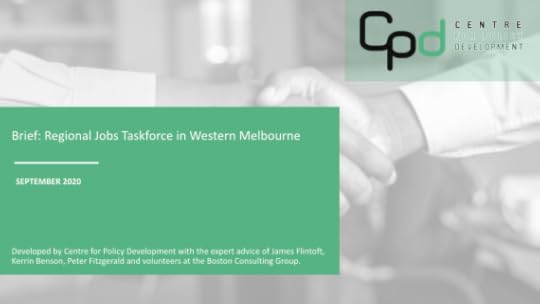
Blueprint: Regional and Community Job Deals
Jobs Taskforce in Western Melbourne
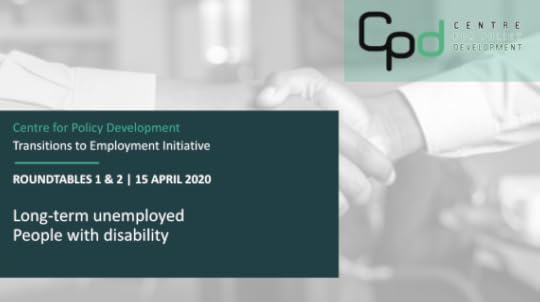
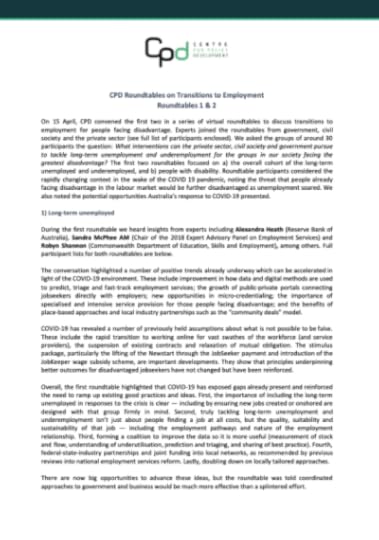
Transitions to Employment Roundtables One and Two: Background materials
Transitions to Employment Roundtables One and Two: Summary and Participant list
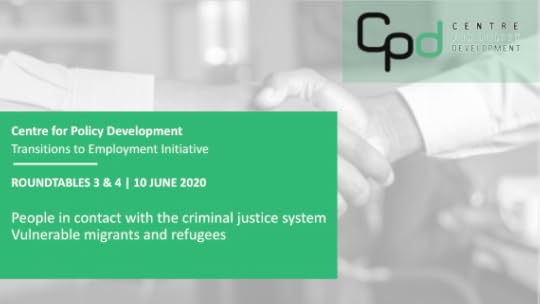
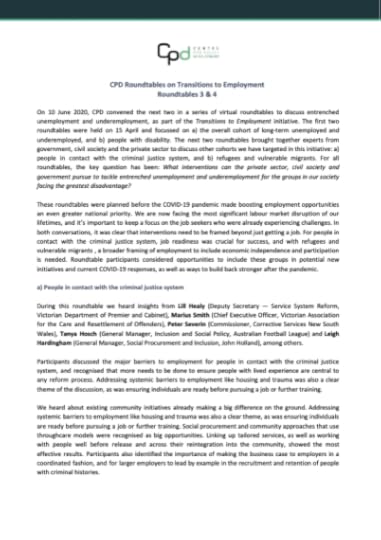
Transitions to Employment Roundtables Three and Four: Background materials
Transitions to Employment Roundtables Three and Four: Summary and Participant list
The first element is CPD’s Blueprint for Regional & Community Job Deals. The blueprint advances CPD’s work on improving employment services in place by showing how this approach can be scaled up across the nation in pivotal regions and places. It illustrates a pathway for implementing, governing and funding place-based initiatives for long-lasting impact on our jobs crisis. It includes a toolkit with practical implementation tips for people and organisations at the forefront of local responses. The blueprint shows how governments, business and philanthropy can support similar approaches across the country in a coordinated way so that vulnerable jobseekers are front of mind on our way out of COVID.
The release of the blueprint coincides with the recent announcement by the Federal Government of the Local Jobs Program and the formation of 25 Local Jobs and Skills Taskforces across the country. CPD, alongside organisations such as the Brotherhood of St Laurence and the Australian Council of Social Service (ACOSS), have long been advocating for regionally tailored responses to be prioritised when it comes to tackling entrenched unemployment, most notably through our Cities and Settlement Initiative. We hope the blueprint and its supporting materials can help to make the Local Jobs Program and its Taskforces as effective as possible. We intend for this to be a living document, one that naturally evolves and responds to the ever-changing employment landscape. As such, we will be continuing consultations with business, government, philanthropy, social services and others to ensure that it continues to be a valuable resource in achieving better outcomes for disadvantaged job seekers.
The second element proposes a Jobs Taskforce for Western Melbourne, one of the employment regions hardest hit by COVID-19. In doing so, we provide an example of what the implementation of the blueprint would look like in practice. While the Local Jobs Program is a good first step, much more will be necessary to deliver a unified, enduring approach in these regions that draws in complementary support from state government, industry, social services and philanthropy — and underpins the new employment services system when it starts in 2022. This proposal shows how that can be done.
The final element is the materials from our Transitions to Employment roundtables held virtually between April and June. Organised and convened by CPD, the roundtables considered interventions that government, business and philanthropy could pursue to tackle long term unemployment and underemployment for the groups in our society facing the greatest disadvantage. Each roundtable was made up of a range of experts from government, civil society and the private sector, and focussed on a specific cohort of jobseekers. The first two discussions focussed on the long-term unemployed and underemployed, and people with disability. The second two roundtables focussed on people in contact with the criminal justice system, and vulnerable migrants and refugees. The roundtables were able to consider the impacts of COVID-19 and what the pandemic means for the range and scale of responses that must be considered.
CPD is grateful to all those involved in developing these materials and hopes they can help Australian communities to build back better in the wake of COVID, and for our most vulnerable jobseekers to be better supported.
Much of the material in the blueprint has emerged from CPD’s Cities and Settlement Initiative (CSI), a 3-year program focused on employment and settlement services for refugees and humanitarian migrants. It was through CSI that CPD developed its Community Deals model, working closely with the City of Wyndham and other local communities. CSI has been made possible by the generous support of the Myer Foundation, the Vincent Fairfax Family Foundation, the Cameron Foundation, the Lord Mayor’s Charitable Foundation and a group of volunteers from the Boston Consulting Group.
The blueprint itself was compiled by CPD, with expert advice from Peter Fitzgerald (former Deputy Secretary, Victorian Department of Health & Human Services), Kerrin Benson (former CEO, Multicultural Australia) and James Flintoft (former CEO, Regional Development Victoria).
CPD’s Employment Transitions Initiative was supported by the Paul Ramsay Foundation.
Quotes from CPD on the release of these materials:
Travers McLeod (CEO)
“The Local Jobs Program accepts just how important locally and regionally focussed responses are in addressing the jobs crisis Australia is experiencing. The challenge now is to deliver a unified, enduring approach in these regions that can deliver for all Australians — one matched with significant stimulus and job creation measures.
“CPD’s blueprint draws on extensive consultations and successful Australian and international case studies. It illustrates a pathway for implementing, governing and funding place-based initiatives for long-lasting impact. Locally and regionally tailored approaches must be sustained for the long term. This means building genuine partnerships between three levels of government and business, providing sustained support to local and regional governance arrangements, and re-orienting our big service systems, like jobactive.”
“The Wyndham Employment Trial has shown how positive employment outcomes can be achieved by promoting tailored, coordinated services that engage local employers and industry. The blueprint shows how governments, business and philanthropy can support similar approaches across the country in a coordinated way so that the vulnerable jobseekers are front of mind on our way out of COVID.”
Terry Moran AC (CPD Chair and Chancellor of Federation University)
“I am proud of the work CPD has done to set out in exacting detail the best possible means of setting up place-based initiatives to help the unemployed and activating critical networks at regional and local level.”
“Post-secondary education institutions need to realise they have a particularly strong role to play in securing return to employment or introduction to employment of the large numbers of people who have had their livelihoods disrupted by this crisis.”
Sam Mostyn (CPD Deputy Chair)
“By listening to, and learning from, communities, CPD and organisations like the Brotherhood of St Laurence and ACOSS have developed models for genuine partnerships between government, business and communities that achieve better outcomes for those who need them most.”
Links and related reading:
Blueprint: Regional and Community Job Deals
Jobs Taskforce for Western Melbourne
Media Release
Travers McLeod, “Democracy can never be sublet”, op-ed for The Australian, 13 July 2020
Cities and Settlement Initiative
Media Release on the Local Jobs Program and Taskforces from the Commonwealth Minister for Employment, Skills, Small and Family Business
Further information on the Local Jobs Program from the Commonwealth Department of Education, Skills and Employment
Victorian Inquiry into Sustainable Employment for Disadvantaged Jobseekers
“I want to work” — report of the 2018 Employment Services Expert Advisory Panel
CPD submission to 2018 Employment Services Expert Advisory Panel
The post New CPD Blueprint for Regional and Community Job Deals appeared first on Centre for Policy Development.
Centre for Policy Development's Blog
- Centre for Policy Development's profile
- 1 follower



